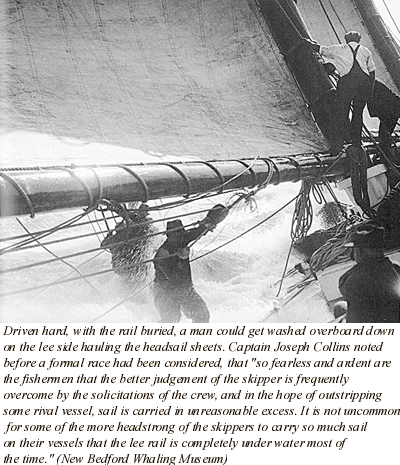
July 1999 News & Comment for and by the Fishermen of Maine SUBSCRIBE NOW!!
Schooner Racing
by Mike Crowe
Men went fishing on the banks gambling on a better trip than the last. They also went for many other reasons - debt, marriage problems, comradeship, and for reasons they couldn't explain as well as for the hell of it.
Sterling Hayden, native Mainer, schooner fisherman, race participant and actor wrote, "Fishermen knew what it was like to bust their guts and haul their hearts outÉ then maybe hang to the vessel's wheel and ease her as she roared toward home and mother with her rail dragging the water, the  salt spray rattling like machine-gun fire off whatever canvas might be drawing her back up under the lee of the land." salt spray rattling like machine-gun fire off whatever canvas might be drawing her back up under the lee of the land."
A fast cruise back from the banks often meant piling on all the canvas. Setting and changing sail combinations with the eight sails schooners typically carried required a high level of skill. Tricks also might come into play. "Dirty tricks, like secretly shifting ballast, disingenuous fouls such as letting out a main boom to damage the rigging on a nearby leeward vessel, conveniently unnoticed mark buoys, and midnight switching of suits of sails were not uncharacteristic of the fishermen for whom a practical joke was the finest kind and yachtsmen's etiquette pure baloney."
Fishermen worked weeks or months on the banks filling a schooner. They might work long stretches of very long days, either being reason enough to want to return to port quickly.
Fishermen had long raced against either each other. They also raced just to get back fast after the boat was filled.
The first organized race among fishing schooners was in 1886. According to William Hale, who wrote The Race It Blew in 1892, the only genuine organized race between regular working fishing vessels, sailed by regular working fishermen was the one he describes in his book.
Whether racing to market or against a rival boat, speed and weather compounded the difficulty, complexity and danger. Climbing into the rigging with the hull heeled over and riding up, over and down swells would up the ante. Verbal communications were dampened by the wind howling through the rigging. The language aboard ship has been attributed by some, in part, to the noise levels at times. Soft sounds, syllables and words that are not heard above the roar are dropped.
Sterling Hayden has described the skill and unique experience of these sailors. "Their everyday task was to catch fish, but their niche in maritime history is due in no small part to their incomparable ability to battle to windward in the teeth of living gales. To say nothing of their capacity to heave to and ride out some of the most daunting weather and infuriate conditions to be found rampaging around on the surface of the Seven Seas."
   
|





 salt spray rattling like machine-gun fire off whatever canvas might be drawing her back up under the lee of the land."
salt spray rattling like machine-gun fire off whatever canvas might be drawing her back up under the lee of the land."